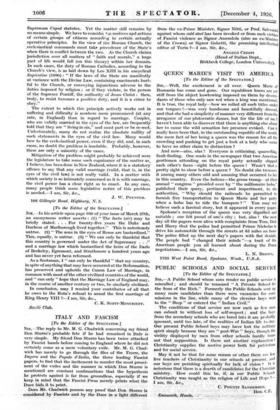(Head of Italian Dept., Birkbeck College; London University). QUEEN MARIE'S
VISIT TO AMERICA [To the Editor of the SPECTATOR.] Sne,—Well, the excitement is all over. Queen Marie of Rumania has come and gone. Our republican knees are yet stiff from the abject kowtowing imposed on them by descen- dants of those who only saw red when a king was mentioned. It is true, the royal lady—how we rolled all such titles under our tongues l—was very handsome and beautifully dressed, and that she had a simplicity of manner very different from the arrogance of our plutocratic dames, but for the life of me I haven't been able to discover that there is anything else about her to cause the wild sensation her presence evoked. Can it really have been that, in the outstanding republic of the world, the mere fact of her being a queen was the reason for all the crowding and pushing to get just a-look at a lady who seems to have no other claim to distinction ?
And now—alas, alas ! Everyone is criticizing, quarrelling,
fault-finding. One reads in the newspaper that two American gentlemen attending on the royal party actually slapped each other's faces—right before the queen ! Wasn't that a pretty sight to show before 'a queen ? No doubt she treasures it among many. others odd and amusing that occurred to her in this country. Even the hoboes—the genus tramp—at their annual " congress " presided over by " the millionaire holm;' published their query, pertinent and 'impertinent, to the authorities, "'Why should the railroads be permitted to furnish free transportation to Queen' Marie and her party when a hobo has to ride the bumpers ? " You may not believe such a farcical story, but it appeared in every paper.
Spokane's reception of the queen was very dignified and suitable ; one felt proud of one's city ; but, alas ! the next day all the papers were alive with.complaints from Tom, Dick and Harry that the police had permitted Prince Nicholas to drive his automobile through the streets at 65 miles an hour. The police filled up the next day's papers with flat denials. The people had "changed their minds "—a trait of the American people you all learned about during the Peace negotiations.—I am, Sir, &c.,
L. N. BnowY.






























































 Previous page
Previous page